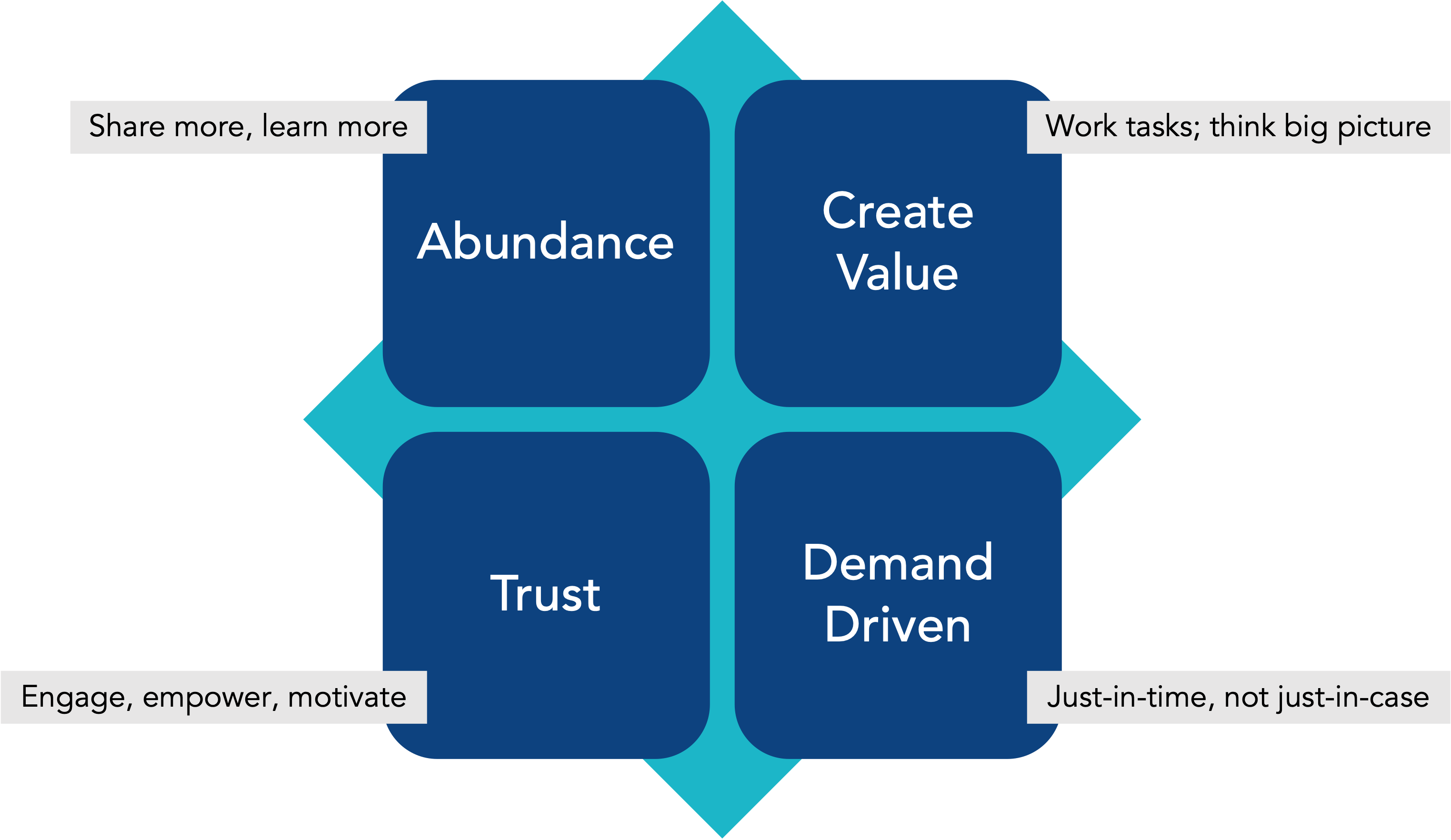Conclusion
"Change is inevitable, growth is optional."
- John C Maxwell
A Note on Structure
 To describe the various methodologies in development by the Consortium, we have found a Principle-based structure to be helpful.
To describe the various methodologies in development by the Consortium, we have found a Principle-based structure to be helpful.
In this structure, the Techniques, Practices, and Core Concepts are specific to each methodology. However, the four Principles are the same and are the foundation of each of the methodologies.
- Techniques = how
- Practices = what
- Core Concepts = themes, characteristics
- Principles = beliefs, philosophy
As the Consortium methodologies mature, they are published in a Practices Guide that defines the Core Concepts, Practices, and Techniques specific to the methodology.
If we want to create an intelligent organization it must be agile: able to adapt to change rapidly. Yet many organizations struggle with digital transformation. Creating an adaptive organization includes leveraging automation as well as the cultural shifts.
Transformational change is hard. In fact, organizations seem to have an endless supply of resistance to change: a hundred reasons why it can't be done. It is as if change represents a threat. Ironically, resisting change is the threat that will render an organization irrelevant. The leadership challenge is to transform the organization's DNA such that change is an organizational competency; it becomes a natural by-product of the work. Leadership must create antibodies to the status quo.
The traditional hierarchical organization often stops or slows down to go through a change initiative or reorganization. An adaptive organization doesn't stop to change... because it never stops changing.
Organizational DNA is made up of the principles and beliefs held by the organization. And, those principles and beliefs are not always explicit or discussed. Being aware of and intentional about why we do the things we do is critical in a successful transformation.
We believe embracing the four principles described in this document will modify the DNA of the organization such that change is comfortable and constant. This transformation creates an organization that remains adaptive and relevant through our rapidly changing environments.

"The measure of intelligence is the ability to change."
- Albert Einstein
Special Thanks
Principles for an Adaptive Organization is based on the experience and observations of the Members of the Consortium for Service Innovation, written by Greg Oxton with edits and feedback from David Kay, Kelly Murray, and Matt Seaman.
RIGHT TO USE WITH ATTRIBUTION
Principles for an Adaptive Organization by Consortium for Service Innovation is licensed under a Creative Commons Attribution-NonCommercial-NoDerivatives 4.0 International License. (Please follow the link for more information and definitions.)
For information about commercial use or any permissions beyond the scope of this license please email info@serviceinnovation.org.
You are free to:
- Share — copy and redistribute the material in any medium or format
- The licensor cannot revoke these freedoms as long as you follow the license terms.
Under the following terms:
- Attribution — You must give appropriate credit, provide a link to the license, and indicate if changes were made. You may do so in any reasonable manner, but not in any way that suggests the licensor endorses you or your use.
- NonCommercial — You may not use the material for commercial purposes.
- NoDerivatives — If you remix, transform, or build upon the material, you may not distribute the modified material.
- No additional restrictions — You may not apply legal terms or technological measures that legally restrict others from doing anything the license permits.
Notices:
- You do not have to comply with the license for elements of the material in the public domain or where your use is permitted by an applicable exception or limitation.
- No warranties are given. The license may not give you all of the permissions necessary for your intended use. For example, other rights such as publicity, privacy, or moral rights may limit how you use the material.
- For information about obtaining a commercial license for these materials please email info@serviceinnovation.org

KCS Principles and Core Concepts by Consortium for Service Innovation is licensed under a Creative Commons Attribution-NonCommercial-NoDerivatives 4.0 International License.
